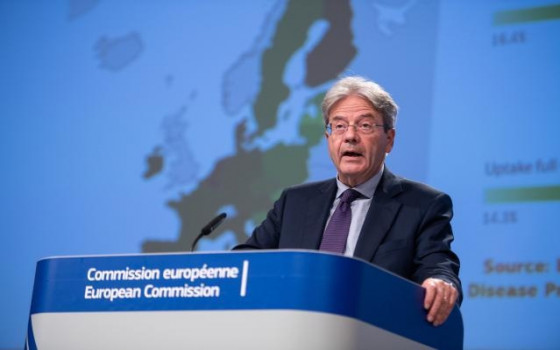
After the meeting of the Eurogroup ministers with the US Treasury Secretary.. European Commissioner: Our economies are sailing in turbulent waters

- Europe and Arabs
- Saturday , 15 October 2022 15:6 PM GMT
Brussels: Europe and the Arabs
On the sidelines of the annual meetings of the International Monetary Fund and the World Bank Group. Eurogroup Ministers held an informal meeting with US Treasury Secretary Janet Yellen. The participants exchanged views on the transatlantic economic prospects and risks. This meeting took place in Washington, D.C., on Friday
“We exchanged views very well with Secretary Yellen, underlining the fact that Europe and America stand together in this difficult situation, and above all their solidarity with Ukraine,” Commissioner Paolo Gentiloni said at the press conference following the meeting. Ukraine has impressed the world with its resistance, resilience, and ability to respond to the Russian invasion, and we will continue to support Ukraine politically, militarily, and financially for as long as it takes. Any attempt by Russia to divide us or the transatlantic alliance will fail.
The European Commission committed earlier this year to provide 9 billion euros in total financial aid to Ukraine. Of this amount, €1 billion was paid during the summer and another €5 billion will be paid by the end of the year, starting this month, and then in November and December. We are actively working with our member states to reach an agreement by the end of the year, to enable the disbursement of the remaining 3 billion euros.
In parallel, and I think that's important, and we've talked about this with Secretary Yellen, we're thinking about a more strategic approach to helping Ukraine in 2023, to give that support more predictability, more stability. The Commission will present our proposals on this in the coming weeks. Of course, Russian aggression has caused shock waves, particularly in the global economy, emerging markets, and low-income economies.
Let me just stress the fact that the European Union stands in solidarity with these countries and supports the activities of the International Monetary Fund, in particular the Poverty Reduction and Growth Fund and the new Trust Fund for Resilience and Sustainability. In Europe, after recovering from the pandemic, you know, our economies are sailing in turbulent waters as we say.
In general, what we stress repeatedly - the President of the Eurogroup and the Commission - and what we also heard repeatedly during these meetings, is that the response to these crises is critical from governments, but we support actions in particular that are targeted and temporary.
And I must say we heard this kind of message coming from all the advanced economies in these groupings. Therefore, these measures must avoid increasing inflation, or creating a permanent burden on public finances. We will evaluate the Member States' upcoming draft budget plans for 2023 also from this perspective. Let me conclude with just one word on international taxes. This was also raised during our meeting, by Secretary Yellen. All members of the OECD Comprehensive Framework and all EU member states, without exception, committed themselves to implementing the historic international agreement reached last year, exactly one year ago. Now it's delivery time. So in the coming months, we will implement.
"The Russian economy is expected to contract this year and next," Yellen said Thursday before meeting European economic officials at the International Monetary Fund and World Bank at the annual meeting in Washington, DC.
“Lost investment, including hundreds of private sector companies that have left the country and are unlikely to return, and restrictions on Russia’s real economy will create a drag on Russia’s growth prospects for years to come,” she said in statements released by the ministry.
The Secretary of the Treasury hosted a meeting with Valdis Dombrovskis, Executive Vice President of the European Commission and Trade Commissioner, and Paolo Gentiloni, European Commissioner for the Economy.
Russia's gross domestic product is expected to contract 6.2% this year and 4.1% in 2023, according to the Economist Intelligence Unit. The forecast is "huge by historical and international standards," Agathe Damari, director of global unity forecasts for CNBC, told CNBC in September.
The Economist Intelligence Unit also said a European boycott of Russian oil would further drain the economy. CNBC reports that the energy sector accounts for about a third of Russia's gross domestic product, including half of all fiscal revenue and 60% of exports.
Yellen and Deputy Treasury Secretary Wally Ademo are touting Russia's G7 strategic oil price cap at this week's International Monetary Fund meetings as an effective way to deprive the Kremlin of income to continue its war against Ukraine.
According to Yellen, the sanctions have effectively made Russia dependent on "suppliers of last resort such as Iran and North Korea for essential military equipment."
"At the same time, we have provided record amounts of military and economic aid to Ukraine," she added, "and we see on the battlefield the military advantage that this growing disparity creates."












No Comments Found